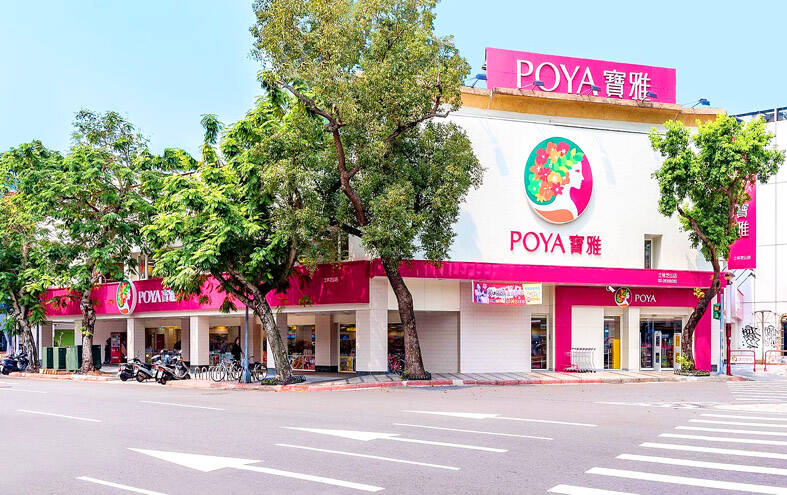Beauty and daily merchandise retailer Poya International Co (寶雅國際) yesterday reported first-quarter profit beyond expectations, as recovering consumer traffic and customer membership programs helped lift its sales.
Poya posted NT$657.61 million (US$21.46 million) in net profit for January to March, up 30.23 percent from NT$504.95 million a year earlier.
That translated into earnings per share (EPS) of NT$6.43, up from NT$5.01 the previous year, marking the highest since the third quarter of 2020, when EPS stood at NT$7.03, company data showed.

Photo courtesy of Poya International Co
Gross margin was also stronger than expected at 44.7 percent in the first quarter, up 1.69 percentage points from a year earlier, while operating margin rose 1.98 percentage points to 15.75 percent after the company’s consolidated sales increased 12.31 percent year-on-year to NT$5.29 billion, the highest for the three-month period in the company’s history.
Fubon Securities Investment Services Co (富邦投顧) earlier said it had expected Poya to post first-quarter sales of NT$5.46 billion and net profit of NT$640 million, with EPS of NT$6.26.
Poya is one of the nation’s major distributors of cosmetic and skincare products, with competitors including Hong Kong’s AS Watson Group and Japan’s Tomod’s Inc.
Poya sells cosmetics, lingerie, skincare and stationery products through its 323 namesake stores, including seven “Poya Beauty” flagship stores, and operates 40 Poya Home hardware outlets.
Fubon said the first-quarter results reflect Poya’s efforts to enhance its operating scale to maintain its leading position among Taiwan’s cosmetics distribution channels.
New product offerings, such as high-margin cosmetics at Poya Beauty stores, could further lift the firm’s gross margin and operating margin in the near future, it added.
Poya said it plans to open 35 to 40 new stores this year, aiming to expand its operating scale to 350 cosmetics stores and 55 hardware outlets by the end of the year.

PROTECTION: The investigation, which takes aim at exporters such as Canada, Germany and Brazil, came days after Trump unveiled tariff hikes on steel and aluminum products US President Donald Trump on Saturday ordered a probe into potential tariffs on lumber imports — a move threatening to stoke trade tensions — while also pushing for a domestic supply boost. Trump signed an executive order instructing US Secretary of Commerce Howard Lutnick to begin an investigation “to determine the effects on the national security of imports of timber, lumber and their derivative products.” The study might result in new tariffs being imposed, which would pile on top of existing levies. The investigation takes aim at exporters like Canada, Germany and Brazil, with White House officials earlier accusing these economies of

Teleperformance SE, the largest call-center operator in the world, is rolling out an artificial intelligence (AI) system that softens English-speaking Indian workers’ accents in real time in a move the company claims would make them more understandable. The technology, called accent translation, coupled with background noise cancelation, is being deployed in call centers in India, where workers provide customer support to some of Teleperformance’s international clients. The company provides outsourced customer support and content moderation to global companies including Apple Inc, ByteDance Ltd’s (字節跳動) TikTok and Samsung Electronics Co Ltd. “When you have an Indian agent on the line, sometimes it’s hard

‘SACRED MOUNTAIN’: The chipmaker can form joint ventures abroad, except in China, but like other firms, it needs government approval for large investments Taiwan Semiconductor Manufacturing Co (TSMC, 台積電) needs government permission for any overseas joint ventures (JVs), but there are no restrictions on making the most advanced chips overseas other than for China, Minister of Economic Affairs J.W. Kuo (郭智輝) said yesterday. US media have said that TSMC, the world’s largest contract chipmaker and a major supplier to companies such as Apple Inc and Nvidia Corp, has been in talks for a stake in Intel Corp. Neither company has confirmed the talks, but US President Donald Trump has accused Taiwan of taking away the US’ semiconductor business and said he wants the industry back

PROBE CONTINUES: Those accused falsely represented that the chips would not be transferred to a person other than the authorized end users, court papers said Singapore charged three men with fraud in a case local media have linked to the movement of Nvidia’s advanced chips from the city-state to Chinese artificial intelligence (AI) firm DeepSeek (深度求索). The US is investigating if DeepSeek, the Chinese company whose AI model’s performance rocked the tech world in January, has been using US chips that are not allowed to be shipped to China, Reuters reported earlier. The Singapore case is part of a broader police investigation of 22 individuals and companies suspected of false representation, amid concerns that organized AI chip smuggling to China has been tracked out of nations such